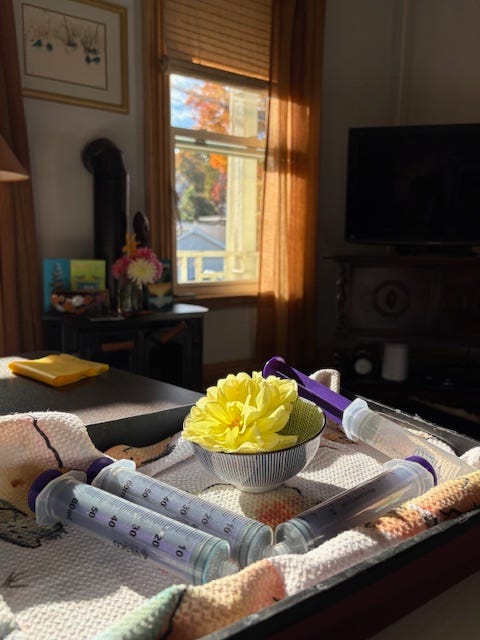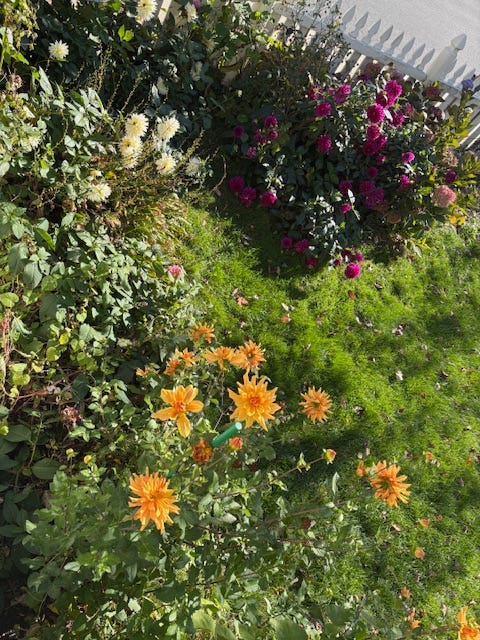This week, my routine of liquid feedings and meds sapped my energy. I felt a boredom I did not experience when actively traveling with delays, cleaning up the kitchen after dinner parties, raking leaves that never stopped falling in our yard. I’m sorry to repeat how boring it feels never to be able to partake of conversation and espresso salmon with sweet potatoes, and key lime pie; or with head drop, not being able to see people’s faces on the street, in an elevator, entering waiting rooms.
Since I’ve lost my voice, I write out my agenda for meetings because I can’t chat or explain things off the cuff. When our respiratory therapist came to troubleshoot three machines, our corgi Isaac sniffed his pantlegs so much, our tech explained he has two corgis at home. Then he guided me to breathe in with the blue line, breathe out with the yellow line, and make a tight seal with the face mask to get the cough assist to help. This is my existence: breathing in, breathing out, trying not to gag while gurgling.
When I went to MGH to have my feeding tube (called a mic-key) replaced in a routine procedure, mine had been hurting for two months, so I got one slightly larger. The mic-key replacement took just seven minutes, but the drive to MGH, the parking, and the drive back wore me out, trying to keep my head erect. I was grateful that Kathleen drove, but the potholes, drivers butting in, sudden starts and stops took their toll on my teetertottering head. The following two days I managed mucus from the stress I felt all day and night.
Sleep used to reward me at the end of the day, but now I dread it, so rarely does it happen easily or for long. In one support group I learned that others with ALS take a variety of meds to sleep. I changed my strategy to sometimes get up at 5am, take my first med on an empty stomach, and then sleep for two hours on the reclining couch in the living room.
Not able to chat, having no treats to savor, I’m grateful for the aroma of Kathleen’s granola, oatmeal with cinnamon and dates, pea soup and cornbread. We love streaming something every night. Does anyone have new streaming ideas? We just watched the couples’ relationships cave, in the fourth season of The Gilded Age and The Diplomat.
I keep one freshly cut dahlia bloom in a cup on my syringe tray for a glimpse of good cheer.
The new fall season gives me hope. I’ve made it this far (after one year since my diagnosis). Now I’m planning to dig up the dahlia tubers when their leaves turn black from the frost. I will have my neck brace by then. With help, I will plant 50 tubers in April in pots in the basement and plant some directly in the ground in May. My new physical therapist said “Your muscles are strong and we can keep them that way with light resistance and strengthening exercises with bands.” So it’s full steam ahead without overdoing it.
I watched an MGH Healey webinar on how best to read scientific papers (in the Lancet and JAMA) to learn what you need to survive with ALS. One graph was multicolored “boxes” to show how many patients were screened, how many randomized for a triaal; one graph was called “whiskers” to show how patients’ function and survival was affected. I saw no fixes for bulbar-onset ALS.
I did send my DNA (as requested by my neurologist); I collected saliva to see if I might be eligible for medications targeted to specific genes causing ALS.
Dr. Richard Bedlack who practices at Duke and created the website ALS Untangled talks about two “home run” drugs recently discovered: Tofersen (for people with SOD1 genetic mutations) and Jacifusen (for people with FUS mutations). By targeting specific subsets, these drugs can stop, or in some cases reverse ALS progression.
In one bulbar-onset support group based in Minneapolis I gave my story of social isolation to the organizer who will share it with legislators in Washington. (I had led a Book Group discussion for my novel Burnt Umber by writing answers to questions and comments and having them read by Kathleen at a potluck. It took all the energy I had.)
In the support group I also learned about the Deanna Protocol and looked it up on the ALS Untangled website. The Conclusion dissuaded me from taking some. ASL Untangled wrote: “Mitochondrial dysfunction, glutamate excitotoxicity, and oxidative stress have all been implicated in ALS pathogenesis, and targeting these mechanisms individually or by a cocktail such as the Deanna Protocol could play a role in future ALS therapies. However, many of the preclinical and animal studies related to these pathways have not translated into successful treatments in patients with ALS. While there are anecdotal reports of improvements in patients with ALS on the Deanna Protocol, there is no convincing objective evidence of benefit yet. Thus, at this time, ALS Untangled does not recommend the Deanna Protocol to patients with ALS.”
The above helped me to incorporate the evidence into my care. Now to move back to the personal, what to do for the holidays? I will relax if possible. My healing conundrum: take a break from so many appointments. Go to Martha’s Vineyard for Christmas. Keep working on what makes sense and gives me joy. I will write honestly and try not to censor myself.
My “mad scientist’s” neck brace diagrams give me the sense that he cares. My new physical therapist’s assessment helps. “You are strong. Your balance is not bad.” I will begin the exercises to slow my ALS down while I search for a miracle to reverse this horrendous disease.




Diane,
Thanks so much for these shows to watch. And yes, I just have to keep soldiering on until next week on Nov. 4th. Can't wait to have the neck brace!
Happy Halloween-- Pam
Dear Pamela, from today’s post, I take away (1) the hope that the neck brace will restore your ability to look at faces; (2) you can maintain your physical strength and balance with targeted exercise; (3) the daily grind of feeds, sleep access, loss of conversation and taste all take a toll; (4) the importance of having dahlia-potting and Christmas and other activities to look forward to. I also see how you’re always engaging with people through the ALS groups and your medical team—a real feat given the challenges of communication. I love you and admire your fidelity to honesty with your devoted readers. Robin